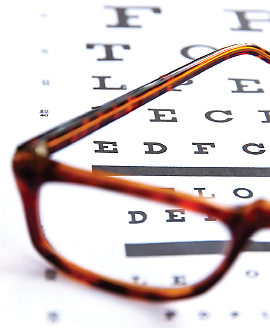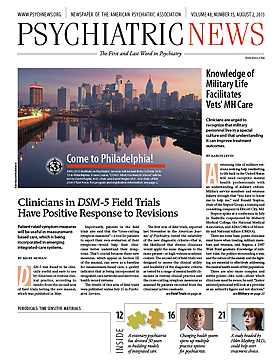One in 10 American adults who report difficulty seeing meets criteria for clinically significant depression, according to research published in the May JAMA Ophthalmology .
“To the best of our knowledge, this is the first study to assess, in a national sample, depressive symptoms in conjunction with visual function and visual-acuity loss,” the researchers said.
The study was headed by Xinzhi Zhang, M.D., Ph.D., an epidemiologist at the National Institute on Minority Health and Health Disparities.
From 2005 to 2008, the Centers for Disease Control and Prevention conducted the National Health and Nutrition Examination Survey. A nationally representative sample of Americans aged 20 or older were extensively interviewed about their health during a home visit and then underwent a detailed medical exam. Some of the questions concerned participants’ vision, and their medical exams included a vision examination. The Patient Health Questionnaire (PHQ-9) depression scale was used to measure depression. Zhang and colleagues then used the vision and depression results from the survey to determine whether there was a link between vision impairment and depression.
They found that 11 percent of subjects reporting difficulty seeing were depressed, compared with only 5 percent of subjects who had no vision problems. A similar pattern was found regardless of how old subjects were or the kinds of vision trouble they reported having. For example, 13 percent of those reporting difficulty reading newsprint or doing close-up work were depressed, compared with 5 percent of those not reporting such difficulty. Sixteen percent of those reporting trouble seeing steps were depressed, compared with 5 percent of those not reporting such trouble, and 25 percent of those reporting difficulty driving during daytime were depressed, compared with 6 percent of those not reporting this difficulty.
Moreover, as the number of visual problems increased among subjects, the prevalence and severity of depression did so as well. Finally, even when possibly confounding factors were considered, subjects who complained about not being able to see were twice as likely to be depressed as subjects who did not complain about it—a statistically significant difference.
While it may not be surprising that vision problems could contribute to developing depression, the researchers noted, “Self-reported visual functioning reflects a person’s perception of his or her ability to perform vision-related activities. The association between visual function loss and depression is complicated. Depression and disability may exist in a bidirectional relationship in which depression leads to disability and in which disability causes depression.”
Indeed, the researchers found a statistically significant association between perceived vision problems and depression, but not a statistically significant association between objectively measured vision loss and depression. These results open the possibility that depression might have, at least in some subjects, led to difficulty seeing rather than vice versa. Yet as Zhang told Psychiatric News, “Because it was a cross-sectional study, we cannot draw a conclusion about causal relationship. We need longitudinal studies to look into this.”
Yet assuming that depression might in some cases lead to difficulty seeing, how might that work? “People who are depressed may not seek out eye care when experiencing visual difficulties,” the researchers suggested. “For those with diagnosed eye conditions, depression may cause poor adherence to treatment, which may, in turn, hasten the progression of vision loss.”
But whether vision problems lead to depression, or vice versa, the findings have clinical implications, the researchers believe. “The high prevalence of depression among people with visual function loss, especially among the older population, suggests that….primary care providers should be aware of the increased risk of depression among those with vision loss. Depression alone is a major cause of disability independent of vision loss….Eye-care professionals should consider patients’ psychological conditions and provide referrals to those exhibiting depressive symptoms.” Zhang added, “Psychiatrists can also play an important role in reducing the combined burden from depression and vision loss.”
The study was funded by the Centers for Disease Control and Prevention and the National Institutes of Health. ■

